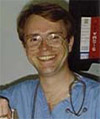Beta blockers reduce risk of death after surgery, study finds

Arthur W. Wallace, MD, PhD
Surgical patients with known heart disease risks who are given beta blockers around the time of surgery have a significantly reduced risk of post-operative death compared with patients not given beta blockers, according to a study by researchers at the San Francisco VA Medical Center.
“We are reducing the short- and long-term risk of death after surgery by about 35 percent with beta blockers,” says lead author Arthur W. Wallace, MD, PhD, an anesthesiologist at SFVAMC and a professor of anesthesiology at the University of California, San Francisco. “And we are doing it for a total cost of about one dollar per patient.”
Beta blockers lower heart rate by blocking the effects of stress hormones, which in turn reduces the risk of chest pain or myocardial ischemia (reduced blood supply to the heart) that can occur when a rapidly beating heart does not receive adequate blood flow.
The study appears in the October 2010 issue of the journal Anesthesiology.
The analysis of 38,779 surgeries of all types performed at SFVAMC from 1996 to 2008 is the largest retrospective study in a clinical setting of the protocol known as perioperative beta blockade, which calls for beta blockers to be given to surgical patients with coronary artery disease, vascular disease, or at least two risk factors for coronary artery disease.
The study showed that surgical patients who were already taking beta blockers before surgery and had at least one dose after surgery, as well as patients not on beta blockers who were given at least one dose after surgery, had a significantly lower 30-day and one-year post-operative mortality rate than patients who never received beta blockers.
Wallace and his colleagues developed and implemented perioperative beta blockade at SFVAMC in 1998 and have helped introduce its use into general surgical practice in the United States.
“This shows what the VA medical system can do,” says Wallace. “We researched and developed a therapy that reduces perioperative mortality by 35 percent, implemented it, spread the idea to other hospitals, and thanks to the VA’s automated medical records system, we are able to demonstrate that it works safely in a very large sample of patients.”
Co-authors of the study are Selwyn Au, MS, of SFVAMC, and Brian A. Cason, MD, of SFVAMC and UCSF.
The study was supported by funds from the Department of Veterans Affairs.
SFVAMC has the largest medical research program in the national VA system, with more than 200 research scientists, all of whom are faculty members at UCSF.
UCSF is a leading university dedicated to promoting health worldwide through advanced biomedical research, graduate-level education in the life sciences and health professions, and excellence in patient care.